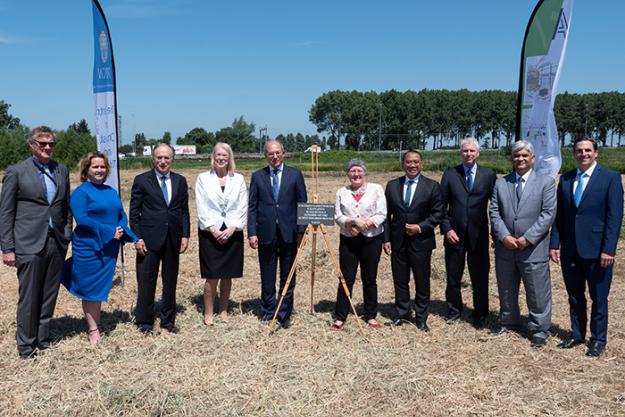
OPCW Director-General, Director-General Designate, Deputy Director-General, and dignitaries at the potential site for the OPCW’s Centre for Chemistry and Technology.
THE HAGUE, Netherlands –13 July 2018– The Director-General of the Organisation for the Prohibition of Chemical Weapons (OPCW), Ambassador Ahmet Üzümcü, visited yesterday the potential site for the OPCW’s Centre for Chemistry and Technology. He was joined by the Permanent Representative of the Kingdom of Spain to the OPCW and Director-General Designate, H.E. Mr Fernando Arias.
The Mayor of Pijnacker-Nootdorp, H.E. Ms Francisca Ravestein; Alderman, Ms Ilona Jense; Permanent Representative of Canada to the OPCW, co-coordinator of the Friends of the Laboratory Group, H.E. Ms Sabine Nölke; Permanent Representative of Indonesia to the OPCW, co-coordinator of the Friends of the Laboratory Group, H.E. Mr I Gusti Agung Wesaka Puja; Permanent Representative of the Kingdom of the Netherlands to the OPCW, H.E. Mr Paul van den Ijssel; and the OPCW Deputy Director-General, H.E. Mr Hamid Ali Rao were also present.
The Director-General, the Director-General Designate, and the Mayor of Pijnacker-Nootdorp unveiled a plaque symbolising the first stone of the Centre for Chemistry and Technology.
The Director-General stated: “Today is the first step in a long journey that I hope will see this greenfield become the home of the Centre for Chemistry and Technology, a state-of-the-art facility that will help lead the way in the global effort to rid the world of chemical weapons.”
“We are proud to welcome OPCW in Pijnacker-Nootdorp and we are looking forward to working with you on this fantastic project,” expressed the Mayor of Pijnacker-Nootdorp.
Background
The project to build an OPCW Centre for Chemistry and Technology is on-going and seeks to strengthen the OPCW’s Science and Technology capabilities to fully address the real threat of chemical weapons, as well as to support capacity building in OPCW Member States.
As the implementing body for the Chemical Weapons Convention, the OPCW oversees the global endeavour to permanently and verifiably eliminate chemical weapons. Since the Convention’s entry into force in 1997 – and with its 193 Member States – it is the most successful disarmament treaty eliminating an entire class of weapons of mass destruction.
Over 96% of all chemical weapon stockpiles declared by possessor States have been destroyed under OPCW verification. For its extensive efforts in eliminating chemical weapons, the OPCW received the 2013 Nobel Peace Prize.
